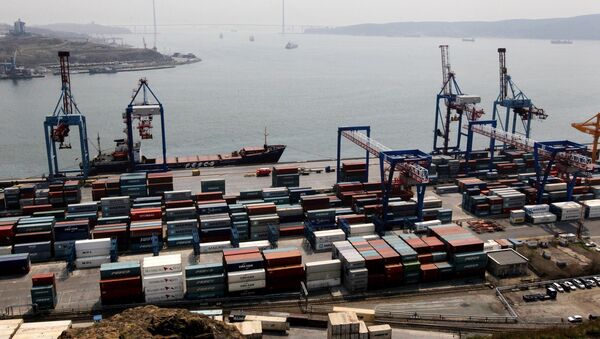This initiative has predictably puzzled Russian lawmakers and businessmen alike because it remains unclear exactly how the US might enact this measure without committing a gross violation of Russia’s sovereignty.
Vladimir Baranov, head of a company which is expected to launch a ferry line between Vladivostok and the North Korean port of Rajin, said that this US move looks like a bluff.
"The US physically cannot control Russian ports – you have to visit the port authority, demand documents, that sort of thing… This is essentially a bluff by the US, an attempt to show that it controls the world. Meanwhile, we’ll be transporting whatever it is we need to transport," Baranov said.
Alexander Latkin, a professor at the Vladivostok State University of Economics and Service, echoed his concerns, adding that any attempt by the US to control Russian ports looks absurd.
"How could the US control our ports’ operations? It might’ve been possible if the US possessed a percentage of the ports’ equity, but as far as I know all of the shareholders are Russian. It is essentially a political move by the US. The Americans don’t have any legal or economic basis for controlling our ports," he explained.
Meanwhile, Maxim Grigoriev, head of the Foundation for the Study of Democracy, told Sputnik Radio that while the US House of Representative adopted the bill virtually anonymously, this entire situation has a touch of tragicomedy to it.
"A declaration about keeping an eye on what’s going on in Russian ports sounds rather funny. However, what happened is that the US judicial authority has empowered its executive counterpart to present a report on this matter, which includes telling whether the sanctions against North Korea are being violated via Russian, Iranian and Syrian ports. I’d like to point out that the bill did not outline any inspection procedure as it would’ve been completely pointless, but the wording itself does look rather ambiguous. The US doesn’t mind that it basically dictates that other countries must adhere to US legislation," he said.
Furthermore, according to Grigoriev, this bill was likely adopted to pave the way for another move against Russia.
"Clearly this is a preparation for some sort of statement to be made against Russia, Syria or China. This measure is unlikely to be related to real politics, because the US doesn’t have any jurisdiction over other countries. But this is an obvious foundation for some propaganda campaign," Grigoriev surmised.
In September 2013, Russia re-opened a 54 kilometer railway link that connects Russia with the North Korean port of Rajin. Russia has expressed its desire to team up with North and South Korea to launch a railroad project that would help establish a rapport between the two estranged neighbors.




